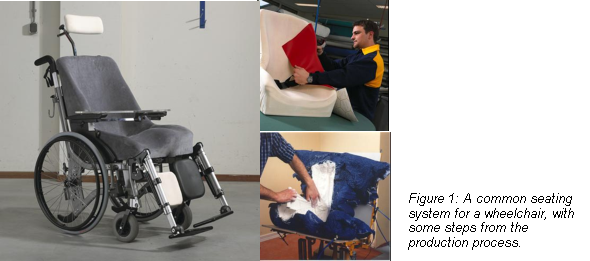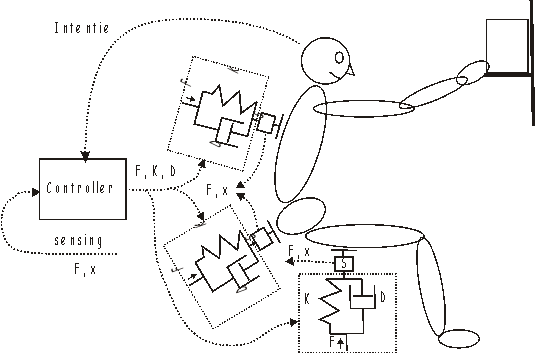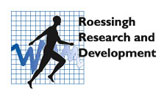Improvement of the quality of seating systems by active control in dynamic support.
Background
The current seating systems have a number of disadvantages:
- The patient has static seating posture, and thus a larger chance to develop decubitus.
- The stability of the patient is not guaranteed. The patient can slip away and has a restricted range of reaching motion.
- The production is very labour-intensive (figure 1).

Development
With the development of dynamic active seating system (figure 2) the disadvantages of the current systems are overcome. Research is facilitated with an experimental wheelchair, aimed at the following goals:
- The prevention of decubitus, based on a regular active change of the support base in the wheelchair seating.
- An active dynamic control of the balance within the wheelchair by measuring and stabilising the seating posture.
- Improvement of the functional range of reaching movement.
Because of this we expect more freedom of movement and comfort for the user.
A working model of the experimental seating system is designed and currently under construction. This will be used in experiments to evaluate biomechanical seating models and be subjected to clinical tests.
It is expected that the results will be used for new wheelchair designs on the short term and in other seating systems (e.g. car industry) on the long term.

Figure 2. Principle of the ‘intelligent’ dynamic seating system: The seating posture is supported with a number of controllable impedances (stiffness K and damping D). The support position (x) and force (F) are measured and fed back into the controller.
Links
Dynasit in UT Nieuws (14-06-2008)
Staff members involved in FreeMotion:
Dr.ir. Bart Koopman (coordinator)
Prof.dr.ir. Peter Veltink (BSS)
Drs. Paul van Geffen (PhD student)
Dr. Marc Nederhand (RRD)
Drs. Jasper Reenalda (PhD student, RRD)
Partners
The project is conducted by a group of 5 Dutch research groups and companies formally cooperating within the Dynasit consortium. The Dynasit project is funded by the Dutch Ministry of Economic Affairs.
| BMTI, University of Twente, EnschedeBMTI is an institute for all (bio-)medical research activities of Twente University. In Dynasit both the Biomedical Signals and Systems Group and the Biomechanical Engineering Group participate. |
| Roessingh Research and Development (RRD), EnschedeRRD is a (internationally) leading research institute in the field of rehabilitation technology- en pain-research. RRD is affiliated to rehabilitation center 't Roessingh in Enschede. |
| Demcon Twente b.v., OldenzaalDemcon is a leading company on product development, mechatronics and engineering. It coordinates the dynasit project. |
| PR Sella b.v., OldenzaalExpertise on pressure related seating products |
| Welzorg, NederlandA nation wide producer and provider of home care products |





